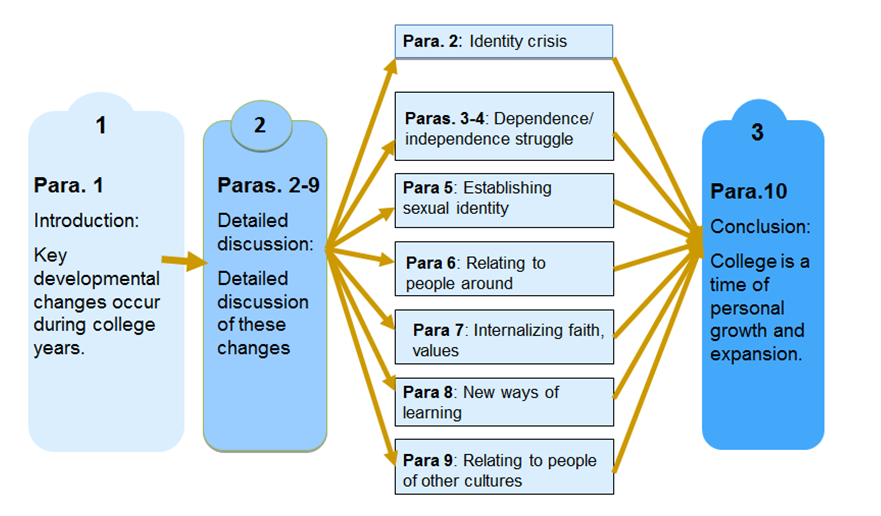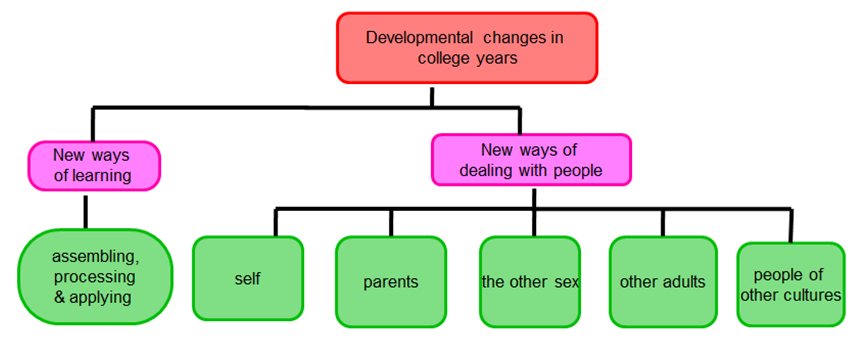Text Analysis: Your College Years
 知识点一
知识点一
I. Warming up
(1)What is the article mainly about?
Developmental changes: a psychological term which refers to the physiological and behavioral changes throughout the lifespan.
(2)How much do you know about developmental changes? What does the author say that strikes you most?
Identity: the qualities that make sb or sth what they are
who you are; what strengths and weaknesses you have; ow you perceive yourself as well as how other people perceive you ( self image and the image you present to others)
Erickson: The identity is “a subjective sense as well as an observable quality of personal sameness and continuity, paired with some belief in the sameness and continuity of some shared world image.”
Identity is highly relational.
(3)What is an identity crisis? Can you define “identity”?
Identity crisis: the difficulties, confusions and anxieties that one goes through when he/she is not sure who he/she is and what his/her purpose in life is
II. Background
Sigmund Freud: (1856-1939)
Father of psychoanalysis, author of The Interpretation of Dreams, famous for his conception of the unconscious, libido, death instinct, the Oedipus/Electra complex, and structural model of human psyche.
Erik Erickson:
Freudian ego-psychologist, “father of psychosocial development” and “the architect of identity.”
III. Text analysis
1. Theme
What does the author mean by developmental changes? Why is it important for college students to be aware of them?
Do you agree with the author that young adults are bound to go through an identity crisis? Is it necessarily a “dangerous” or “negative” incident in our life?
Why does the author emphasize the change in the way of dealing with knowledge as an important aspect of our growth?
2.Style
a) Genre:
expository essay, e.g. formal, serious, academic, educational
b) Diction:
big, complicated, formal words, technical jargon, e.g.
personnel, occur, adolescence, adulthood
c) Syntax:
long, involved sentences, e.g.
paras. 4, 6 (During the course…)
d) Techniques:
quotation, e.g.
in…(source); according to…;
sb remarks/observes/comments/points out/defines…
parallelism, e.g.
words (para. 2): strengths and weaknesses
phrases (para. 2): determined by genetic endowment; shaped by environment; influenced by chance events
sentences (para. 1): 3 consecutive questions
other techniques?
Para.3 is developed by comparison.
Para.4 is developed by quotation and categorization.
3.Structure

4. Detailed Analysis
(1) Part I: Discussion
What goals do you have for your growth and maturity during your college years?
(2) Part II: Discussion
①Explain the sentence “How people see themselves in both roles is unquestionably a part of their identity.” What does “both roles” refer to?
②Did you experience independence/dependence struggle in your later adolescence stage?
③Why does the author say it may be heightened by the students’ choice to pursue a college education?
④What are the four distinct aspects of late adolescents’ psychological separation from their parents?
⑤Why should college students stand back to see where they are in the independence/dependence struggle?
⑥What is meant by “establishing their sexual identity”? Why is it stressful?
⑦How is para. 4 developed?
⑧How does college students change the way they relate to others as they grow and reach young adulthood?
⑨What is meant by “internalizing religious faith”?
⑩Do you think you have in some way internalized values and beliefs? What new insights have you gained in this respect?
⑪Why does the author think it is important to become a world citizen?
Recap of part II: content

(3) Part III: Discussion
What is the author’s conclusion?
IV. Reinforcement:
1. Discussion
(1) What does the author say about developmental changes that you find particularly relevant to your life?
(2) Have you gained freedom now that you are a college student? If the answer is yes, how are you enjoying your newly acquired freedom?
(3) What kind of beliefs, values and morals have you “internalized” since you came to the university? Do you think the college life has helped you deal with your developmental changes?
